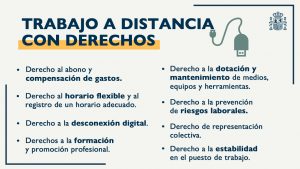The regulatory framework for teleworking was one of the main topics of the webinar of the day September 11 at 11 a.m., where Juan José Banciella professor of the master's degree in Human Resources Management was the speaker and where one of the following topics was addressed.
What is teleworking?
Teleworking is a form of work activity that is carried out remotely, it is 50 years old, it is not that it has been invented now, but we can say that with the pandemic this method has helped several companies test this method of working. work and see some of its advantages, such as allowing you to have a well-organized work, with freedom and flexibility of schedules.
The new reality
As a consequence of the coronavirus crisis, teleworking has become the way to make the maintenance of productive activities compatible with the confinement decreed under a state of alarm, raising the incidence of remote work in Spain to 34% of the total employed , as recently indicated by a study by the Valencian Institute of Economic Research, which placed employees who in 2019 worked from home normally or more than half of the days at 4.8%.
Advantages of virtual meetings
• Time savings by not having to travel.
• Ease of meeting, in addition to being able to hold several meetings on the same day.
• Possibility of going further.
• You share documents (chats, links, etc.)… If you forget some material or suddenly want to see something you hadn't planned on, you can share it.
• You can record the session.
• Allows you to add specific participants quickly.
• You join various groups with which you work remotely. Distance is no longer a problem.
• With teleworking my routine is not affected. Flexibility and adaptability. (If a meeting is canceled you can adapt).
Some of the regulations are:
- Teleworking is considered when the worker works more than 30% of his weekly work day, although it started with 20%.
- Its objective is to regulate the conditions of workers when this modality is chosen.
- The agreement of both parties must be signed within a period of three months.
- Remote workers will be able to exercise collective representation rights.
- Workers who do not adapt to this modality can work from the office.
This regulatory framework aims to achieve equal treatment between those workers who decide to telework and those who continue to attend the company's facilities, establish work and rest times and have companies take care of the expenses that workers assume. when they work from home.
This October 13, the Ministry of Labor and Social Economy left us this tweet guaranteeing labor rights supported by remote work.





































